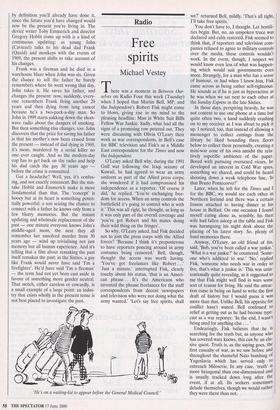Radio
Free spirits
Michael Vestey
There was a moment in Between Our- selves on Radio Four this week (Tuesday) when I hoped that Martin Bell, MP, and the Independent's Robert Fisk might come to blows, giving rise in my mind to the pleasing headline: Man in White Suit Biffs Fellow War Junkie. Sadly, what had all the signs of a promising row petered out. They were discussing with Olivia O'Leary their work as war correspondents, in Bell's case for BBC television and Fisk's as a Middle East correspondent for the Times and now the Independent.
O'Leary asked Bell why, during the 1991 Gulf war following the Iraqi seizure of Kuwait, he had agreed to wear an army uniform as part of the Allied press corps; she wondered if it had compromised his independence as a reporter. 'Of course it did,' he replied. 'You're exchanging free- dom for access. When an army controls the battlefield it's going to control who is with it.' This was all right, he thought, as long as it was only part of the overall coverage and 'you've got Robert and his mates doing their wild thing on the fringes'.
So why, O'Leary asked, had Fisk decided not to join the press corps with the Allied forces? 'Because I think it's preposterous to have reporters poncing around in army costumes being censored.' Bell, though, thought the access was worth having. 'You've got freelances like Robert ...' 'Just a minute,' interrupted Fisk, clearly touchy about his status, 'that is an Ameri- can phrase. . . It's the Americans who invented the phrase freelances for the staff correspondents from decent newspapers and television who were not doing what the army wanted.' Let's say free spirits, shall 'He's on a waiting-list to appear before the General Medical Council.' we?' returned Bell, mildly. 'That's all right, I'll take free spirits.'
You don't have to, I thought. Let hostili- ties begin. But, no, an unspoken truce was declared and calm restored. Fisk seemed to think that, if reporters and television com- panies refused to agree to military controls over the media, these controls wouldn't work. In the event, though, I suspect we would know even less of what was happen- ing which would suit governments even more. Strangely, for a man who has a sense of humour, or had when I knew him, Fisk came across as being rather self-righteous. He sounds as if he is just as hyperactive as he was when we sat next to each other at the Sunday Express in the late Sixties.
In those days, perspiring heavily, he was not content to use one phone at a time but quite often two, a hand suddenly crashing on to my receiver as I was about to pick it up. I noticed, too, that instead of allowing a messenger to collect cuttings from the library he liked bounding three floors below to collect them personally, creating a mini-war zone of his own amidst the rela- tively soporific ambience of the paper. Bored with pursuing oversexed vicars, he developed an interest in Cold War spies, something we shared, and could be heard shouting down a weak telephone line, 'Is that Bruno Pontecorvo?'
Later, when he left for the Times and I for the BBC, we would see each other in Northern Ireland and there was a certain frisson attached to having dinner at his house in Belfast. On one occasion I found myself eating alone as, sensibly, his then wife had fallen asleep at the table and Fisk was haranguing his night desk about the placing of his latest story. So, plenty of fond memories there.
Anyway, O'Leary, an old friend of his, said, 'Bob, you've been called a war junkie.' 'What is a war junkie?' he countered. 'Some- one who's addicted to war.' No,' replied Fisk, 'someone who needs war in order to live, that's what a junkie is.' This was unin- tentionally quite revealing, as it suggested to me that Fisk might well find in wars some sort of reason for living. He said the attrac- tion came in being on hand to write the first draft of history but I would guess it was more than that. Unlike Bell, his appetite for conflict hasn't waned. Bell confessed to relief at getting out as he had become type- cast as a war reporter: 'In the end, I wasn't being used for anything else ... Endearingly, Fisk believes that he is searching for the truth but, as anyone who has covered wars knows, this can be an elu- sive quest. Truth is, as the saying goes, the first casualty of war, as we saw before and throughout the shameful Nato bombing of Yugoslavia which has served only to entrench Milosevic. In any case, 'truth' is more hexagonal than one-dimensional and is usually tracked down long after the event, if at all. Its seekers sometimes delude themselves, though we would rather they were there than not.










































































 Previous page
Previous page